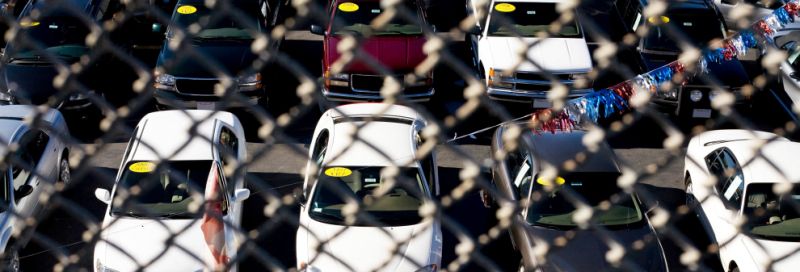On Friday, New York Attorney General Eric Schneiderman announced settlements with 104 car dealerships that sold vehicles with unresolved safety recalls without informing the buyers.
The settlements allow dealers to market used cars with open safety recalls as long as they disclose the issue in their advertising and in the showroom before the sale.
It’s the latest wrinkle in a consumer-unfriendly trend that has opened up the sale of more potentially unsafe used cars to the public.
The settlements with the dealerships come weeks after the Federal Trade Commission finalized settlements allowing auto dealer companies to market used cars with unresolved safety recalls, as long as they provide a general statement in advertising that the cars might be subject to a recall.
The FTC settlements from March require used car dealers tell customers how to check for open safety recalls. It’s unclear, however, if the FTC will require dealers to disclose open recalls they already know about.
A Threat to Public Safety
Consumer groups say the incidents of consumers buying used cars with open safety recalls are becoming more common. More cars are being recalled, with automakers reporting defects in more than 50 million vehicles in each of the last three years. The National Highway Traffic Safety Administration estimates that 25 percent go unaddressed.
Consider the case of Christine Teasley, a mother of two in Kansas City, Kan. Twice after she purchased a 2013 Nissan Altima last July the hood flew up while she was driving, one time while she was on the highway with her kids in the back. Teasley searched online for the reason this was happening and discovered the car had two safety recalls, one for a problem with the hood latch and another for a problem with the airbag sensor. The dealer had told her about neither.
“I was just so angry,” she says. “If there had been a car in front or behind me, I could have injured somebody or we could have been injured ourselves.”
The FTC settlements resolve the agency’s complaints that dealers had been misleading consumers by advertising “certified preowned” and other used cars as having passed rigorous inspections or reconditioning but then selling them even if they had open safety recalls.
Consumer advocates, who had called for an outright ban on this practice, say that the recent FTC settlements could encourage more dealers to sell cars that are unsafe.
They’re allowing car dealerships to mislead buyers about the safety of their cars, says Rosemary Shahan, president of the California-based Consumers for Auto Reliability and Safety, which is suing the agency in federal court. Two other groups are also part of the lawsuit—the Center for Auto Safety and the U.S. Public Interest Research Group.
The new FTC rule also effectively preempts state laws that might hold dealers liable if they sell cars with open safety recalls, says Norman Silber, who teaches consumer law at Hofstra University in New York.
Consumers Union, the policy and mobilization division of Consumer Reports, has criticized the settlement. “No company should offer to sell a car that has a defect that hasn’t been fixed. It’s an irresponsible practice that could put consumers at risk,” says William Wallace, a Consumers Union policy analyst. It’s even more deceptive, he says, if the car has been labeled certified pre-owned.
While saying that unresolved recalls in used cars pose a “serious threat to public safety,” the FTC noted that no federal agency currently has the authority to ban the sale of such cars outright.
Legislation for a ban has failed to advance in Congress. Federal law already prohibits dealers from selling new cars with safety recalls, and it bans car rental companies from selling or renting them.
Schneiderman’s office says it doesn’t have the authority to ban the sales but that Schnedierman supports state legislation that would.
In a statement released after the FTC settlements were made final, CarMax, one of the dealers named in its complaint, said it was committed to making sure customers know about unresolved recalls on any used vehicle it sells. The company also says that because only authorized dealers can handle recall-related repairs, consumers are often better off taking their cars directly to the dealer.
[Source:-yahoo]





